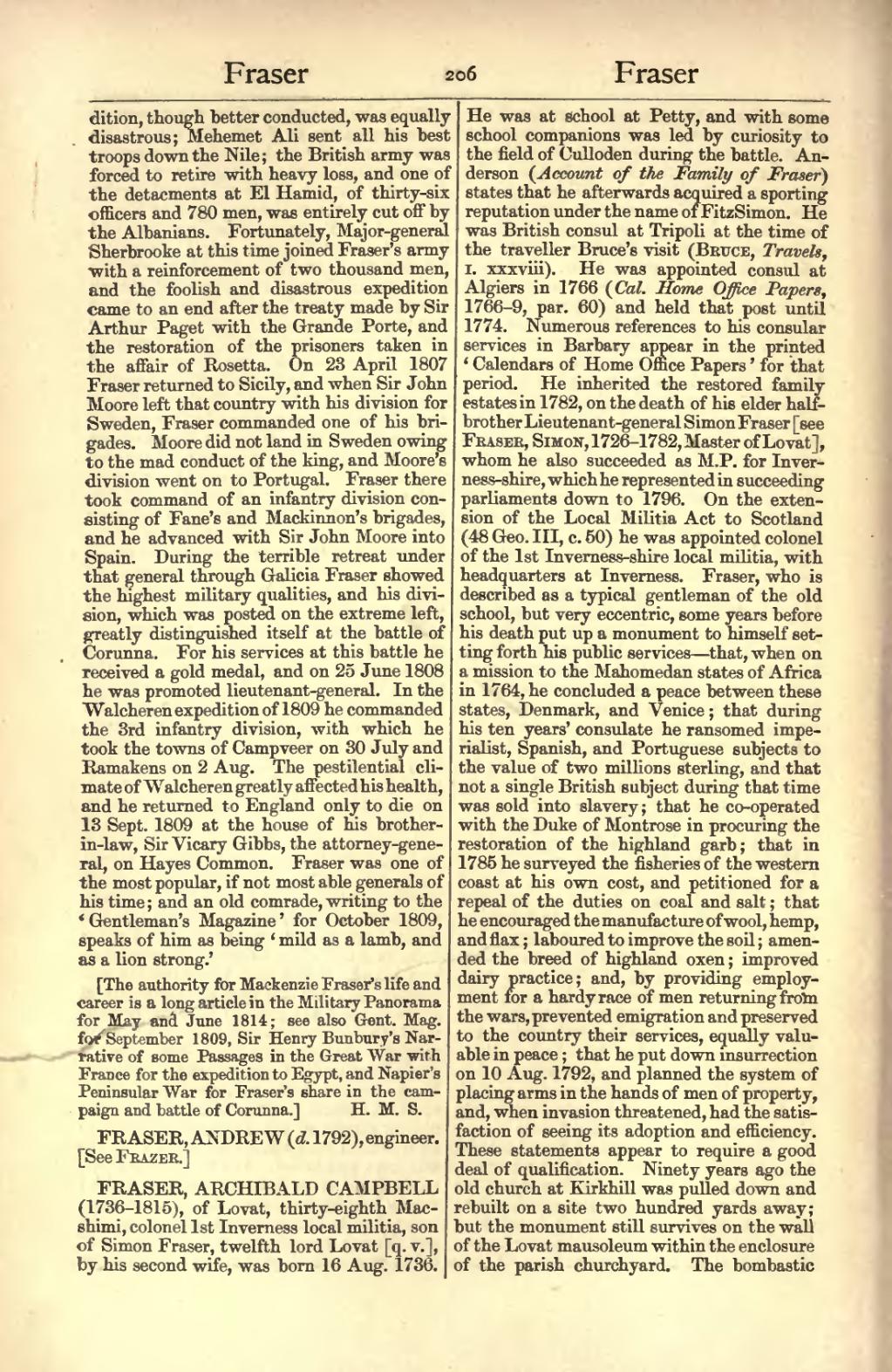dition, though better conducted, was equally disastrous; Mehemet Ali sent all his best troops down the Nile; the British army was forced to retire with heavy loss, and one of the detacments at El Hamid, of thirty-six officers and 780 men, was entirely cut off by the Albanians. Fortunately, Major-general Sherbrooke at this time joined Fraser's army with a reinforcement of two thousand men and the foolish and disastrous expedition came to an end after the treaty made by Sir Arthur Paget with the Grande Porte, and the restoration of the prisoners taken in the affair of Rosetta. On 23 April 1807 Fraser returned to Sicily, and when Sir John Moore left that country with his division for Sweden, Fraser commanded one of his brigades. Moore did not land in Sweden owing to the mad conduct of the king, and Moore's division went on to Portugal. Fraser there took command of an infantry division consisting of Fane's and Mackinnon's brigades, and he advanced with Sir John Moore into Spain. During the terrible retreat under that general through Galicia Fraser showed the highest military qualities, and his division, which was posted on the extreme left, greatly distinguished itself at the battle of Corunna. For his services at this battle he received a gold medal, and on 25 June 1808 he was promoted lieutenant-general. In the Walcheren expedition of 1809 he commanded the 3rd infantry division, with which he took the towns of Campveer on 30 July and Ramakens on 2 Aug. The pestilential climate of Walcheren greatly affected his health, and he returned to England only to die on 13 Sept. 1809 at the house of his brother-in-law, Sir Vicary Gibbs, the attorney-general, on Hayes Common. Fraser was one of the most popular, if not most able generals of his time; and an old comrade, writing to the 'Gentleman's Magazine' for October 1809, speaks of him as being 'mild as a lamb, and as a lion strong.'
[The authority for Mackenzie Fraser's life and career is a long article in the Military Panorama for May and June 1814; see also Gent. Mag. for September 1809, Sir Henry Bunbury's Narrative of some Passages in the Great War with France for the expedition to Egypt, and Napier's Peninsular War for Fraser's share in the campaign and battle of Corunna.]
FRASER, ANDREW (d. 1792), engineer. [See Frazer.]
FRASER, ARCHIBALD CAMPBELL (1736–1815), of Lovat, thirty-eighth Macshimi, colonel 1st Inverness local militia, son of Simon Fraser, twelfth lord Lovat [q. v.], by his second wife, was born 16 Aug. 1736. He was at school at Petty, and with some school companions was led by curiosity to the field of Culloden during the battle. Anderson (Account of the Family of Fraser) states that he afterwards acquired a sporting reputation under the name of FitzSimon. He was British consul at Tripoli at the time of the traveller Bruce's visit (Bruce, Travels, i. xxxviii). He was appointed consul at Algiers in 1766 (Cal. Home Office Papers, 1766-9, par. 60) and held that post until 1774. Numerous references to his consular services in Barbary appear in the printed 'Calendars of Home Office Papers' for that period. He inherited the restored family estates in 1782, on the death of his elder half-brother Lieutenant-general Simon Fraser [see Fraser, Simon, 1726-1782, Master of Lovat], whom he also succeeded as M.P. for Inverness-shire, which he represented in succeeding parliaments down to 1796. On the extension of the Local Militia Act to Scotland (48 Geo. Ill, c. 50) he was appointed colonel of the 1st Inverness-shire local militia, with headquarters at Inverness. Fraser, who is described as a typical gentleman of the old school, but very eccentric, some years before his death put up a monument to himself setting forth his public services—that, when on a mission to the Mahomedan states of Africa in 1764, he concluded a peace between these states, Denmark, and Venice; that during his ten years' consulate he ransomed imperialist, Spanish, and Portuguese subjects to the value of two millions sterling, and that not a single British subject during that time was sold into slavery; that he co-operated with the Duke of Montrose in procuring the restoration of the highland garb; that in 1785 he surveyed the fisheries of the western coast at his own cost, and petitioned for a repeal of the duties on coal and salt; that he encouraged the manufacture of wool, hemp, and flax; laboured to improve the soil; amended the breed of highland oxen; improved dairy practice; and, by providing employment for a hardy race of men returning from the wars, prevented emigration and preserved to the country their services, equally valuable in peace; that he put down insurrection on 10 Aug. 1792, and planned the system of placing arms in the hands of men of property, and, when invasion threatened, had the satisfaction of seeing its adoption and efficiency. These statements appear to require a good deal of qualification. Ninety years ago the old church at Kirkhill was pulled down and rebuilt on a site two hundred yards away; but the monument still survives on the wall of the Lovat mausoleum within the enclosure of the parish churchyard. The bombastic
